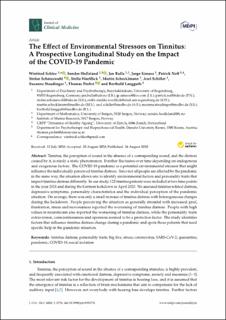| dc.contributor.author | Schlee, Winfried | |
| dc.contributor.author | Hølleland, Sondre | |
| dc.contributor.author | Bulla, Jan | |
| dc.contributor.author | Simoes, Jorge | |
| dc.contributor.author | Neff, Patrick | |
| dc.contributor.author | Schoisswohl, Stefan | |
| dc.contributor.author | Woelflick, Stella | |
| dc.contributor.author | Schecklmann, Martin | |
| dc.contributor.author | Schiller, Axel | |
| dc.contributor.author | Staudinger, Susanne | |
| dc.contributor.author | Probst, Thomas | |
| dc.contributor.author | Langguth, Berthold | |
| dc.date.accessioned | 2021-02-16T11:50:02Z | |
| dc.date.available | 2021-02-16T11:50:02Z | |
| dc.date.created | 2020-09-01T12:11:44Z | |
| dc.date.issued | 2020-08 | |
| dc.Published | Journal of Clinical Medicine. 2020, 9 (9), 1-11. | |
| dc.identifier.issn | 2077-0383 | |
| dc.identifier.uri | https://hdl.handle.net/11250/2728363 | |
| dc.description.abstract | Tinnitus, the perception of sound in the absence of a corresponding sound, and the distress caused by it, is rarely a static phenomenon. It rather fluctuates over time depending on endogenous and exogenous factors. The COVID-19 pandemic is a potential environmental stressor that might influence the individually perceived tinnitus distress. Since not all people are affected by the pandemic in the same way, the situation allows one to identify environmental factors and personality traits that impact tinnitus distress differently. In our study, 122 tinnitus patients were included at two time points: in the year 2018 and during the German lockdown in April 2020. We assessed tinnitus-related distress, depressive symptoms, personality characteristics and the individual perception of the pandemic situation. On average, there was only a small increase of tinnitus distress with heterogeneous changes during the lockdown. People perceiving the situation as generally stressful with increased grief, frustration, stress and nervousness reported the worsening of tinnitus distress. People with high values in neuroticism also reported the worsening of tinnitus distress, while the personality traits extraversion, conscientiousness and openness seemed to be a protection factor. The study identifies factors that influence tinnitus distress change during a pandemic and spots those patients that need specific help in the pandemic situation. | en_US |
| dc.language.iso | eng | en_US |
| dc.publisher | MDPI | en_US |
| dc.rights | Navngivelse 4.0 Internasjonal | * |
| dc.rights.uri | http://creativecommons.org/licenses/by/4.0/deed.no | * |
| dc.title | The Effect of Environmental Stressors on Tinnitus: A Prospective Longitudinal Study on the Impact of the COVID-19 Pandemic | en_US |
| dc.type | Journal article | en_US |
| dc.type | Peer reviewed | en_US |
| dc.description.version | publishedVersion | en_US |
| dc.rights.holder | Copyright by the authors | en_US |
| dc.source.articlenumber | 2756 | en_US |
| cristin.ispublished | true | |
| cristin.fulltext | original | |
| cristin.qualitycode | 1 | |
| dc.identifier.doi | https://doi.org/10.3390/jcm9092756 | |
| dc.identifier.cristin | 1826448 | |
| dc.source.journal | Journal of Clinical Medicine | en_US |
| dc.source.40 | 9 | |
| dc.source.14 | 9 | |
| dc.source.pagenumber | 1-11 | en_US |
| dc.source.volume | 9 | en_US |
| dc.source.issue | 9 | en_US |

